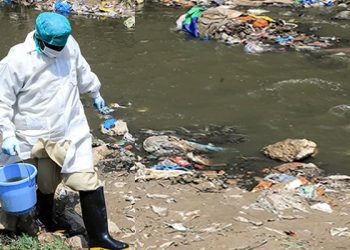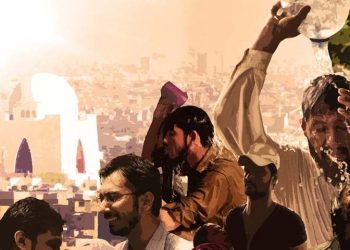As the issue of elections in Punjab and Khyber Pakhtunkhwa (KP) comes to an apparent impasse due to indecision of the stakeholders, a nine-member larger bench of the Supreme Court (SC) is adjudicating on the matter today.
The proceeding of the case commenced at 2pm today following the suo moto notice by Chief Justice of Pakistan (CJP) Justice Umar Ata Bandial.
The bench comprises the CJP, Justice Ijazul Ahsan, Justice Syed Mansoor Ali Shah, Justice Munib Akhtar, Justice Yahya Afridi, Justice Sayyed Mazahar Ali Akbar Naqvi, Justice Jamal Khan Mandokhail, Justice Muhammad Ali Mazhar and Justice Athar Minallah.
However, the bench has been mired in controversy after Pakistan Bar Council (PBC) raised objections to judges constituting it.
The CJP took suo moto notice after a division bench of the top court referred the matter of delay in polls in both provinces to the top judge, asking him to invoke suo moto jurisdiction.
In the notice, CJP Bandial said that the top court’s bench would consider the following questions:
- Who has the constitutional responsibility and authority for appointing the date for the holding of a general election to a provincial assembly, upon its dissolution in the various situations envisaged by and under the Constitution?
- How and when is this constitutional responsibility to be discharged?
- What are the constitutional responsibilities and duties of the federation and the province with regard to the holding of the general election?
PBC objects
Pakistan Bar Council (PBC) has objected to exclusion of Justice Qazi Faez Isa and Justice Sardar Tariq from the larger bench hearing the case.
In a press release, PBC’s top brass said that the inclusion of both judges would make its image impartial and neutral.
Apart from this, the council also urged Justice Mazahar Ali Akbar Naqvi – against whom a reference has been filed – to recuse from the bench voluntarily.
President Alvi closes the book
Closing the book on the elections in Punjab and KP earlier on Monday, President Arif Alvi unilaterally announced the date for the much-anticipated electoral process.
The elections in both provinces – where PTI dissolved assemblies to force snap poles – will be held on April 9.
In a letter to the Chief Election Commissioner (CEC) Sultan Sikandar Raja, the president wrote, “Please refer to my letter dated February 8, 2023 wherein Election Commission of Pakistan was advised to immediately announce the date for general elections for Provincial Assemblies of Punjab and Khyber Pakhtunkhwa.”
“Subsequently, Chief Election Commissioner was invited vide letter of even number dated February 17, 2023 for meeting on February 20, 2023 at 11:00 AM for consultation, in terms of Section 57 (1) of Elections Act, 2017, to announce the date for the general elections of the aforementioned Assemblies,” Alvi noted.
He added, “The Governors of Punjab and Khyber Pakhtunkhwa are not performing their constitutional duties for appointing a date, not later than ninety days from the date of dissolution of Provincial Assemblies as per the Constitution of Pakistan. The Election Commission of Pakistan (ECP) is also not fulfilling its constitutional obligation for holding polls for the Assemblies of Punjab and Khyber Pakhtunkhwa. Both the constitutional offices are placing the ball in each other’s court, similar to the old Urdu proverb پہلے آپ، نہیں پہلے آپ, resulting in delay and creating a serious danger that constitutional provisions may be violated.”
Alvi contended that section 57(1) of the Elections Act, 2017, empowers the president to “announce the date or dates of the general elections after consultation with the Commission”.
“Therefore, I have felt it necessary to perform my constitutional and statutory duty to announce the date of elections to avoid the infringement and breach of the Constitution and law i.e. holding of elections not later than ninety days.”
Alvi recalled that serious attempts for consultation with the commission as envisaged by Section 57(1) of the Election Act have been made vide letters of even number dated February 8 and 17, and inviting the CEC for meeting, however did not bear fruit.
He went on to add that there being no restraining order from any of the judicial fora, there is no impediment in invoking the power and authority vested in him under section 57 (1) of the Elections Act, 2017.
Therefore, the president exercised conferred upon me under section 57 (1) of Elections Act, 2017.
“I, hereby, announce the date of April 9, 2023 (Sunday) for holding of general elections of the Provincial Assemblies of Punjab and Khyber Pakhtunkhwa.”
The president noted that the election commission is obliged under the law to issue election schedule in accordance with Section 57 (2) of Elections Act, 2017.
As the issue of elections in Punjab and Khyber Pakhtunkhwa (KP) comes to an apparent impasse due to indecision of the stakeholders, a nine-member larger bench of the Supreme Court (SC) is adjudicating on the matter today.
The proceeding of the case commenced at 2pm today following the suo moto notice by Chief Justice of Pakistan (CJP) Justice Umar Ata Bandial.
The bench comprises the CJP, Justice Ijazul Ahsan, Justice Syed Mansoor Ali Shah, Justice Munib Akhtar, Justice Yahya Afridi, Justice Sayyed Mazahar Ali Akbar Naqvi, Justice Jamal Khan Mandokhail, Justice Muhammad Ali Mazhar and Justice Athar Minallah.
However, the bench has been mired in controversy after Pakistan Bar Council (PBC) raised objections to judges constituting it.
The CJP took suo moto notice after a division bench of the top court referred the matter of delay in polls in both provinces to the top judge, asking him to invoke suo moto jurisdiction.
In the notice, CJP Bandial said that the top court’s bench would consider the following questions:
- Who has the constitutional responsibility and authority for appointing the date for the holding of a general election to a provincial assembly, upon its dissolution in the various situations envisaged by and under the Constitution?
- How and when is this constitutional responsibility to be discharged?
- What are the constitutional responsibilities and duties of the federation and the province with regard to the holding of the general election?
PBC objects
Pakistan Bar Council (PBC) has objected to exclusion of Justice Qazi Faez Isa and Justice Sardar Tariq from the larger bench hearing the case.
In a press release, PBC’s top brass said that the inclusion of both judges would make its image impartial and neutral.
Apart from this, the council also urged Justice Mazahar Ali Akbar Naqvi – against whom a reference has been filed – to recuse from the bench voluntarily.
President Alvi closes the book
Closing the book on the elections in Punjab and KP earlier on Monday, President Arif Alvi unilaterally announced the date for the much-anticipated electoral process.
The elections in both provinces – where PTI dissolved assemblies to force snap poles – will be held on April 9.
In a letter to the Chief Election Commissioner (CEC) Sultan Sikandar Raja, the president wrote, “Please refer to my letter dated February 8, 2023 wherein Election Commission of Pakistan was advised to immediately announce the date for general elections for Provincial Assemblies of Punjab and Khyber Pakhtunkhwa.”
“Subsequently, Chief Election Commissioner was invited vide letter of even number dated February 17, 2023 for meeting on February 20, 2023 at 11:00 AM for consultation, in terms of Section 57 (1) of Elections Act, 2017, to announce the date for the general elections of the aforementioned Assemblies,” Alvi noted.
He added, “The Governors of Punjab and Khyber Pakhtunkhwa are not performing their constitutional duties for appointing a date, not later than ninety days from the date of dissolution of Provincial Assemblies as per the Constitution of Pakistan. The Election Commission of Pakistan (ECP) is also not fulfilling its constitutional obligation for holding polls for the Assemblies of Punjab and Khyber Pakhtunkhwa. Both the constitutional offices are placing the ball in each other’s court, similar to the old Urdu proverb پہلے آپ، نہیں پہلے آپ, resulting in delay and creating a serious danger that constitutional provisions may be violated.”
Alvi contended that section 57(1) of the Elections Act, 2017, empowers the president to “announce the date or dates of the general elections after consultation with the Commission”.
“Therefore, I have felt it necessary to perform my constitutional and statutory duty to announce the date of elections to avoid the infringement and breach of the Constitution and law i.e. holding of elections not later than ninety days.”
Alvi recalled that serious attempts for consultation with the commission as envisaged by Section 57(1) of the Election Act have been made vide letters of even number dated February 8 and 17, and inviting the CEC for meeting, however did not bear fruit.
He went on to add that there being no restraining order from any of the judicial fora, there is no impediment in invoking the power and authority vested in him under section 57 (1) of the Elections Act, 2017.
Therefore, the president exercised conferred upon me under section 57 (1) of Elections Act, 2017.
“I, hereby, announce the date of April 9, 2023 (Sunday) for holding of general elections of the Provincial Assemblies of Punjab and Khyber Pakhtunkhwa.”
The president noted that the election commission is obliged under the law to issue election schedule in accordance with Section 57 (2) of Elections Act, 2017.


















































